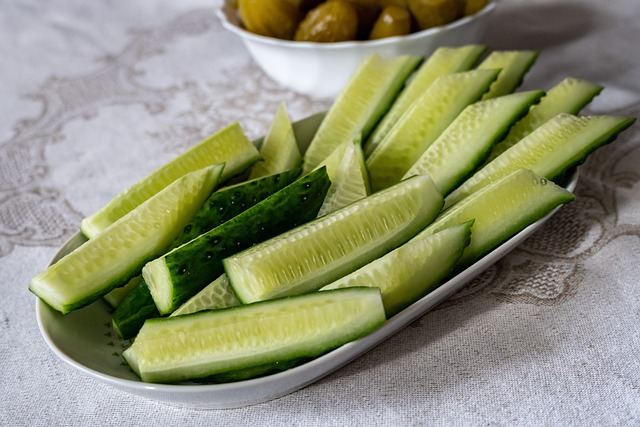Introduction
Natural foods are unexpected blessings for human health. Cucumbers, especially in the summer season, have a special place due to their unique properties.
Cucumber not only provides internal cooling to the body but also has positive effects on many aspects of health.
This article will shed light on the nutritional properties of cucumber, its medical benefits, and its immense scientific use in summer.
Introduction to cucumber

Cucumber has the scientific name Cucumis sativus, and it is a member of the Cucurbitaceae family.
Benefits of cucumber. Cucumbers are commonly used in salads, juices, pickles, and other foods around the world.
Cucumbers are among the light vegetables and provide most of their nutrition through water.
Nutritional properties of cucumber
Cucumber is an excellent food rich in nutrients. It has a very low energy content, meaning that every 100 grams of cucumber provides about 15 calories.
95 percent of a cucumber consists of water, which is very useful for hydration of the body.
Apart from this, cucumber is a light source of protein, which is about 0.7 grams per 100 grams, and carbohydrates are also in a very small amount, namely 3.6 grams.
Cucumber is also rich in fiber, which improves the digestive system.
About 16.4 micrograms of vitamin K and 2.8 milligrams of vitamin C are found in cucumbers. Similarly, the amount of potassium is about 147 milligrams, and the amount of magnesium is 13 milligrams per 100 grams of cucumber, which are very important for the nervous system and heart health.
Key Features
Cucumber is an excellent source of hydration.
It is rich in antioxidants, which protect cells from damage.
Its low-calorie content and high fiber content make it helpful in weight loss.
Cucumber production in the world
China is the largest cucumber-producing country in the world.
After that, India, Russia, the United States, and Iran are prominent in cucumber production.
Importance of cucumber in summer
Reduction in body temperature
In summer, the internal temperature of the body increases, which causes problems like fatigue, dizziness, and heat stroke.
Cucumber keeps the body cool from the inside and helps prevent heat stroke.
Prevents dehydration
Excessive sweating can lead to dehydration.
Cucumber, which contains 95% water, quickly replenishes the body’s water deficit.
Supply of mineral salts
The balance of salts (electrolytes) deteriorates in summer.
Cucumber provides minerals like potassium and magnesium, which are essential for the health of the nervous system and heart.
Source of energy and refreshment
Eating cucumber provides instant refreshment to the body and reduces physical fatigue.
Scientific Benefits of Cucumber
Antioxidant Properties
Cucumber contains several important antioxidants, such as:
Beta-carotene
Flavonoids
Tannins
These compounds neutralize free radicals in the body, which can cause premature aging, cancer, and heart disease.
Helps in weight loss
Cucumber’s high fiber content and low calorie content are key components in weight loss.
Including cucumbers in the daily diet reduces appetite and prevents excess fat from accumulating in the body.
Improves heart health
Potassium keeps blood pressure under control.
Antioxidants maintain the health of blood vessels.
Fiber helps in lowering cholesterol.
Improves digestion
Cucumber is a good source of fiber
Prevents constipation
Soothes the stomach
Helps in digestion
Good for skin and hair
Cucumber is rich in vitamin C and silicon.
Moisturizes the skin
Reduces wrinkles
Helps in hair growth
Strengthens bones
Vitamin K is important for bone health and is present in good quantities in cucumber, which strengthens bones and reduces the risk of fractures.
More uses of cucumber in summer
Cucumber detox water
Put a few cucumber slices in water and leave for 2-3 hours.
This water helps to remove toxins from the body.
Cucumber face mask
Applying blended cucumber to the skin cools the skin and reduces sunburn.
Cucumber smoothie
A smoothie can be prepared by mixing yogurt, mint, and cucumber, which is the best summer drink.
Potential disadvantages of using cucumber
Although cucumber is generally safe, some precautions are necessary:
Potential toxic ingredients
Sometimes cucumbers turn bitter, which can produce toxic compounds called cucurbitacins, which can cause gastrointestinal upset.
Allergies
Some people may experience allergic reactions to cucumbers, such as itching, swelling, or difficulty breathing.
Digestive problems
Consuming large amounts of cucumbers may cause gas or bloating in some people.
Precautions
Use fresh and quality cucumbers.
Wash cucumbers thoroughly before using them to avoid chemicals and germs.
Avoid excessive amounts; 1-2 cucumbers per day is enough.
Conclusion
Cucumbers are a wonderful food given by nature, especially in the summer season when the body is in dire need of water, mineral salts, and cooling.
It is low in calories, high in water, and a treasure trove of vitamins, minerals, and antioxidants, which not only controls body temperature but is also a great helper in digestive, skin, heart, and weight problems.
Moderate consumption of cucumbers in your daily diet helps in promoting overall health.
Incorporating cucumbers into your diet in summer not only increases your energy but also keeps your body healthy, refreshed, and active.


